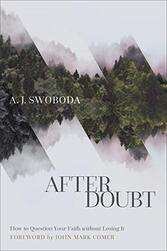 In his book After Doubt, A. J. Swoboda suggests that "In Christian formation, diversity is only possible as long as there is unity in the baseline. We cannot lovingly disagree if we have nothing to agree on" (149). Soon after, the author continues the theme with these words, "There's a world of difference between having a faith of our own and making up our own faith" (149). Each time I baptize someone, I ask the question well-known to Christians (based on Romans 10:9): "What is your declaration of faith?" Within the larger Christian family (Church), methods vary in baptismal practices. Broadly speaking, churches practice either credo-baptism or pedo-baptism. Credo-baptism = baptism of believers Pedo-baptism = baptism of infants At Rabbit Creek, we practice credo-baptism. We do so based on the understanding that baptism marks and, therefore, should take place after a person believes in Jesus as Lord. Faith and baptism are personal decisions. While personal, they are not singular. That is to say, those acts of following Jesus, while done/received by an individual, indicate that a person is part of the Christian family. The Christian family to which they belong shares dogma which are "those core Christian beliefs that have been passed down from the apostles to us today" (Swoboda 148). While there is room for friendly debate on non-essentials, people of the Christian family are to hold to the dogma of faith. Log on each week to this blog to read summaries of some of the dogmas of the Christian faith. #ordinarylives For further reading: Swoboda, A.J. After Doubt: How to Question Your Faith Without Losing It. Grand Rapids: Brazos Press, 2021.
0 Comments
Leave a Reply. |
Archives
October 2023
|
 RSS Feed
RSS Feed